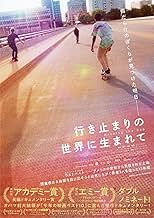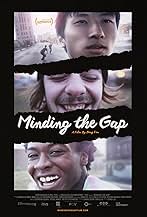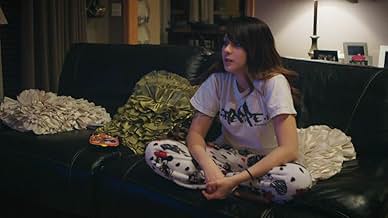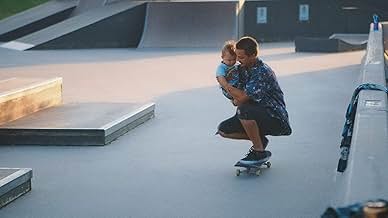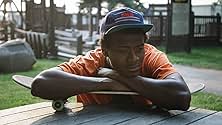Filmmaker Bing Liu searches for correlations between his skateboarder friends' turbulent upbringings and the complexities of modern masculinity.Filmmaker Bing Liu searches for correlations between his skateboarder friends' turbulent upbringings and the complexities of modern masculinity.Filmmaker Bing Liu searches for correlations between his skateboarder friends' turbulent upbringings and the complexities of modern masculinity.
- Nominated for 1 Oscar
- 60 wins & 53 nominations total
Featured reviews
Honestly I didn't find this sort of movie meaning skaters to be my type of documentary. But I love a great thought provoking documentary. It's brilliant and beautiful in so many ways. I totally recommend watching.
From the breathtaking, fluid camera work to the increasingly brutal, honest emotionality, this documentary is a brilliant piece of work that needs to be seen by all, especially young men for whom this should be mandatory viewing.
Bing Lu's "Minding the Gap" is more than a sleek skateboarding doc that dives into alternative culture; in fact, it might not even be that at all. What probably began as an exercise in Lu turning the camera on himself and his friends blossomed into portrait of middle-American working-class life, specifically three young men who process hardship and deep emotional wounds best while on a skateboard.
Lu, his friend Zack and their younger friend, Kiere are the main subjects of the story, each passionate skaters trying to get by in their hometown of Rockford, Illinois. Piecing together that skating is symptomatic of something deeper between them, Lu decides to probe Zack and Kiere, gently pushing them toward emotional honesty. What he uncovers is a troubling and all-too-true reality that each of them is enduring, a revelation that transforms the entire viewing experience.
The film is full of these subtle, unexpected surprises. Most documentaries make an assertion or hypothesis that the filmmakers explore in depth, and the stories have an intuitive arc to them. "Minding the Gap" takes place over the course of many years and even includes footage from several years earlier, but that's not immediately apparent. Our perception of the story, along with its scope and impact, changes the longer the movie's timeline gets. Essentially, Lu's patience with his story pays off tremendously; letting these characters' lives play out deepens and enriches everything.
Time factors in the most in Zack's tumultuous relationship with Nina. She's pregnant when we meet them, and as their baby boy, Elliott, begins to grow, their lives and their relationship struggles take on a different urgency. Lu captures lots of critical moments in their journey (usually from either his or her perspective separately), which proves vital to the film because so much of the rest is reflective, specifically on Lu and Kiere's childhoods. The Zack-Nina relationship is, in effect, a microcosm of so many of the obstacles, struggles and themes of all the characters' lives.
As personal as the film gets, however, it's also a technical accomplishment. Lu conveys not just the cool, but also the zen of skateboarding that these characters experience through excellent action shots. He and co-editor Joshua Altman nail those movement sequences on top of powerfully stitching together so many different moments and stories. The film sometimes gets so deep into the characters' emotional lives that skateboarding feels irrelevant, but the extent to which skateboarding provides escape and "therapy" as one character puts it sinks completely in by the end.
Here are these men who will gladly risk every limb to land a trick yet are reticent to take emotional risks. Only Lu's close relationship with these subjects allows them to open up. His own sense of an imperative to ask them the tough, honest questions and blur his role between filmmaker and friend/relative creates the film's most powerful material. At a few points, subjects ask him if they should pretend he's not there or talk to him like they're having a conversation, suggesting the strong influence of his dual-role in his film.
Yet "Minding the Gap" is far from self-centered and self-serving. Rather, it is indicative of how some stories can only be collected and recorded by the people who live them. We'll need more brave filmmakers like Lu in order to discover these stories and let their truth find the eyes, ears and hearts of those who identify with and need them most.
Thanks for reading! Visit Movie Muse Reviews for more
Lu, his friend Zack and their younger friend, Kiere are the main subjects of the story, each passionate skaters trying to get by in their hometown of Rockford, Illinois. Piecing together that skating is symptomatic of something deeper between them, Lu decides to probe Zack and Kiere, gently pushing them toward emotional honesty. What he uncovers is a troubling and all-too-true reality that each of them is enduring, a revelation that transforms the entire viewing experience.
The film is full of these subtle, unexpected surprises. Most documentaries make an assertion or hypothesis that the filmmakers explore in depth, and the stories have an intuitive arc to them. "Minding the Gap" takes place over the course of many years and even includes footage from several years earlier, but that's not immediately apparent. Our perception of the story, along with its scope and impact, changes the longer the movie's timeline gets. Essentially, Lu's patience with his story pays off tremendously; letting these characters' lives play out deepens and enriches everything.
Time factors in the most in Zack's tumultuous relationship with Nina. She's pregnant when we meet them, and as their baby boy, Elliott, begins to grow, their lives and their relationship struggles take on a different urgency. Lu captures lots of critical moments in their journey (usually from either his or her perspective separately), which proves vital to the film because so much of the rest is reflective, specifically on Lu and Kiere's childhoods. The Zack-Nina relationship is, in effect, a microcosm of so many of the obstacles, struggles and themes of all the characters' lives.
As personal as the film gets, however, it's also a technical accomplishment. Lu conveys not just the cool, but also the zen of skateboarding that these characters experience through excellent action shots. He and co-editor Joshua Altman nail those movement sequences on top of powerfully stitching together so many different moments and stories. The film sometimes gets so deep into the characters' emotional lives that skateboarding feels irrelevant, but the extent to which skateboarding provides escape and "therapy" as one character puts it sinks completely in by the end.
Here are these men who will gladly risk every limb to land a trick yet are reticent to take emotional risks. Only Lu's close relationship with these subjects allows them to open up. His own sense of an imperative to ask them the tough, honest questions and blur his role between filmmaker and friend/relative creates the film's most powerful material. At a few points, subjects ask him if they should pretend he's not there or talk to him like they're having a conversation, suggesting the strong influence of his dual-role in his film.
Yet "Minding the Gap" is far from self-centered and self-serving. Rather, it is indicative of how some stories can only be collected and recorded by the people who live them. We'll need more brave filmmakers like Lu in order to discover these stories and let their truth find the eyes, ears and hearts of those who identify with and need them most.
Thanks for reading! Visit Movie Muse Reviews for more
In Rockford, Illinois, the lives three young male friends (all of different racial backgrounds) and their families are the subject of this documentary focusing on the town's history of high unemployment, financial hardship, and domestic violence and how this affects individual lives. One of the friends, Bing Liu, is also the director and interviewer of the film.
The film footage takes place over a number of years. The beginning shows the boys as teenage skateboard experts. The first impression is that this is a skateboard doc but it doesn't take long for the film to show its true depth. The testimonies of the abuse from the subjects regarding husbands / partners / fathers / step-fathers have much in common but are also unique. One of the commonalities is a phrase that has sadly been repeated, in various forms, for decades: "yes, he can be terribly mean but when he's nice, he's really so sweet". In one such case, the abuse is subtle as the voice of an unseen man gives an "order" to his female partner who is being interviewed.
The film's boldest moments include those focusing on one of the young men (Zack) who is starting to fall into this negative pattern. What he's doing is wrong but the viewer has already felt compassion for him from previous excerpts. A film-maker is at his/her best when the viewer is left with conflicting feelings such as this case.
"Minding the Gap" has many strong qualities. One is that its creator is not from the outside looking in but one of the insiders. To maintain composure and seem neutral to the history that is so close to him is remarkable. - dbamateurcritic
The film footage takes place over a number of years. The beginning shows the boys as teenage skateboard experts. The first impression is that this is a skateboard doc but it doesn't take long for the film to show its true depth. The testimonies of the abuse from the subjects regarding husbands / partners / fathers / step-fathers have much in common but are also unique. One of the commonalities is a phrase that has sadly been repeated, in various forms, for decades: "yes, he can be terribly mean but when he's nice, he's really so sweet". In one such case, the abuse is subtle as the voice of an unseen man gives an "order" to his female partner who is being interviewed.
The film's boldest moments include those focusing on one of the young men (Zack) who is starting to fall into this negative pattern. What he's doing is wrong but the viewer has already felt compassion for him from previous excerpts. A film-maker is at his/her best when the viewer is left with conflicting feelings such as this case.
"Minding the Gap" has many strong qualities. One is that its creator is not from the outside looking in but one of the insiders. To maintain composure and seem neutral to the history that is so close to him is remarkable. - dbamateurcritic
Minding the Gap follows the lives of three young men who share a passion for skating. It's not long until we find out that skating is a way for them to escape from their troubled home lives.
This is such a deeply intimate documentary, made with a real yearning to show something to the world. Because of all the heart it was made with, everything captured is so enticing. Documentaries often feel like documentaries, that feels like quite an obvious thing to say but that is usually why a lot of people choose not to watch them. However, this film doesn't feel like a documentary, and the fact it is makes it very shocking and overwhelming at times because you are taken on such a moving journey. These are real people therefore everything we see is true, that's the obvious thing, but everything we see in Minding the Gap is raw and completely unfiltered and it's so special. It presents everything as it is and doesn't try to be a certain way which is the key as to why it is so captivating. You can't hate the characters because you know their struggle yet of course they are not perfect. I think that's why I'm starting to love documentaries like this: when you watch a film characters often fall into a good or bad category so you love them or hate them, of course cinema has a wide expanse and that includes characters so therefore we still love and identify with characters who have flaws or we love the villain because they're just so damn good. With documentaries however they are real people not trying to be like anyone or not trying to represent anything, therefore you cant love them or hate them you just accept them and digest what they have to show. It makes you learn more about the human experience, people in the world and that I think is so amazing.
I don't like the term eye-opening really because it does sound kind of patronising, our eyes should be opened to everything really, but this film does make you think and will definitely stir up your emotions. Worth the watch just so so much.
Did you know
- TriviaThe Film was shot in the span of 12 years
- Quotes
Zack Mulligan: Your whole life society tells you, like 'oh, be a man, and you are strong and you are tough and margaritas are gay' you know, like. You know. You don't grow up thinking that's the way you are. When you're a kid, you just do, you just act and then somewhere along the line, everyone loses that.
- ConnectionsFeatured in The Oscars (2019)
- SoundtracksVideo Life
Written by Chris Spedding, Stephen W. Parsons
Performed by Chris Spedding
Courtesy of Warner Music UK, Ltd.
- How long is Minding the Gap?Powered by Alexa
Details
- Release date
- Country of origin
- Official sites
- Language
- Also known as
- Долаючи провалля
- Filming locations
- Rockford, Illinois, USA(East State Street)
- Production companies
- See more company credits at IMDbPro
Box office
- Gross US & Canada
- $11,998
- Opening weekend US & Canada
- $6,812
- Aug 19, 2018
- Gross worldwide
- $90,328
- Runtime
- 1h 33m(93 min)
- Color
- Sound mix
- Aspect ratio
- 1.85 : 1
Contribute to this page
Suggest an edit or add missing content



